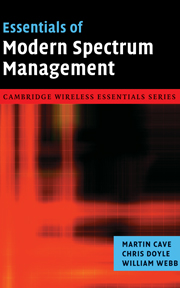17 - Conclusions
Published online by Cambridge University Press: 13 August 2009
Summary
A reminder of the problem
At the start of this book we said that spectrum needs to be managed to avoid the interference between different users becoming excessive. We noted that the key purpose of spectrum management is to maximise the value that society gains from the radio spectrum by allowing as many users as possible while ensuring that the interference between different users remains manageable. Then we observed that the current “command-and-control” approach was unlikely to achieve this objective and was becoming more difficult to manage as an ever expanding range of applications arose. Instead, we noted how increasingly spectrum managers were turning to economic management methods to achieve their duties.
Key conclusions
We made the following conclusions.
Technological advances. The advance of technology is having some impact on spectrum management. Multi-modal radios are gradually reducing the advantages of international harmonisation, making it easier for regulators to allow the use of market forces. Technologies that provide “underlays” (UWB) or “overlays” (cognitive radio) might require radical changes to spectrum management, but in practice cognitive radio may be best enabled simply by providing spectrum owners with sub-leasing capabilities while UWB can be accommodated as an increased noise floor for existing owners.
Division of spectrum. While there are many alternative methods of dividing access to spectrum, all can be accommodated as a subdivision within the current overall process of division by frequency. For example, after a division by frequency, it is possible to further subdivide by time, angle, polarisation, geography or use. The regulator could choose to make this division themselves, or they could provide the licence holder with the freedom to do so, perhaps through the flexible type of licence envisaged under trading. Hence, major changes to spectrum management caused by technology look unlikely.
[…]
- Type
- Chapter
- Information
- Essentials of Modern Spectrum Management , pp. 247 - 252Publisher: Cambridge University PressPrint publication year: 2007



